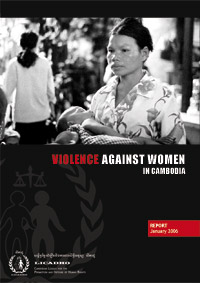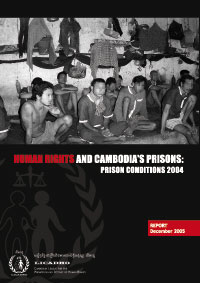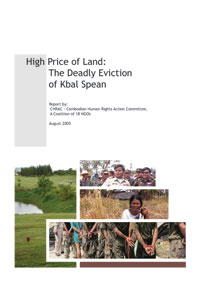Search
Statement | Release on Bail of the Remaining Four Detainees
17 January 2006
The Cambodian Human Rights Action Committee (CHRAC), a coalition of 18 NGO members, welcomes the release on bail of Mam Sonando, Rong Chhun, Kem Sokha and Pa Nguon Teang, which follows the similar release last week of Yeng Virak. We are pleased that all of them have been temporarily freed from prison and are able to be reunited with their families.
We hope that this positive and encouraging news will be followed by the withdrawal of the criminal complaints against these five men and other individuals by the government, and the dropping of all charges against them by the Phnom Penh Municipal Court. Such an action would be a further significant step toward ensuring the protection of freedom of expression, other human rights and future economic development in Cambodia.
Article | Civil Society Members Show Support for Detainees
16 January 2006
On January 14, 2006, more than 150 members of human rights organizations, unions and other groups gathered in front of Prey Sar prison to show support for Mam Sonando, Rong Chhun, Kem Sokha and Pa Nguon Teang, all all detained inside the prison on defamation or related charges. Community Legal Education Center executive director Yeng Virak, who until recently was also detained with the other four men in the prison, was present at the event.
Briefing | Attacks on Freedom of Expression & Political Rights
16 January 2006
Freedom of expression and other democratic rights are under dire threat in Cambodia, as the government continues to use the judiciary to imprison its critics and political opponents. Prominent human rights activists, journalists and trade unionists, as well as opposition members of parliament, have been targeted in a series of government-initiated prosecutions.
Article | UN Rules Against Imprisonment of Cheam Channy
12 January 2006
An independent United Nations body has ruled that the detention of Sam Rainsy Party MP Cheam Channy is in violation of both Cambodian and international law.
In a decision communicated to the Cambodian government on 25 November 2005 and now made public, the UN Working Group on Arbitrary Detention (WGAD) found that the Cambodian Military Court had no jurisdiction over Cheam Channy, a civilian and Member of Parliament for Kampong Cham province.
Statement | Joint Statement on the Arrests of Human Rights Activists
12 January 2006
We, the under-signed members of Cambodian NGOs and civil society, deeply regret the arrest and detention of Cambodian Center for Human Rights president Kem Sokha, Community Legal Education Center director Yeng Virak, and Cambodian Center for Human Rights deputy president Pa Nguon Teang, on charges of defamation.
The arrests relate to the celebrations held in Phnom Penh to mark International Human Rights Day on December 10, 2005, which were attended by more than 10,000 people. This rare and important event was authorized by the government and organized by NGOs and other civil society organizations. The authorization and support for this mass gathering of people seemed to be a positive step to promote human rights in Cambodia. Therefore, we are deeply disappointed by the subsequent arrests of Kem Sokha, Yeng Virak, and Pa Nguon Teang, which have created fear within civil society and the public, restricted freedom of expression, and set back human rights in Cambodia.

1 January 2006
Whilst violence against women in Cambodia is a difficult issue to accurately quantify, it is clear that it is a serious problem and there are an increasing number of reports of domestic violence, rape and trafficking. Although Cambodia is beginning to recognize the significance of these issues the extent of the government's willingness to educate the judiciary, the police and the public on these issues is still very limited.
Cambodia ratified the Convention on the Elimination of all Forms of Discrimination Against Women (CEDAW) in 1992 and since then there has been insufficient action undertaken by the government to implement the principles contained in the convention. Most notably the Royal Government of Cambodia (RGC) passed the Law on the Prevention of Domestic Violence and the Protection of Victims in September 2005 and a draft Law on Human Trafficking and Sexual Exploitation is currently being reviewed by law-makers. However the RGC's progress in reducing/eliminating violence against women since 1992 has been slow and often inadequate.

31 December 2005
Since 1997, LICADHO has issued reports on human rights in Cambodian prisons, highlighting the most serious human rights concerns and recommending avenues of change. As an independent non-governmental organization, LICADHO has several key aims: 1/Monitor Cambodian prisons and prisoners' rights 2/Disseminate relevant high-quality non-partisan information. 3/Lobby for positive reform.
It is our hope that this report will be used by government and prison officials, human rights advocates, researchers, media, aid donors and legal professionals as a tool to identify existing problems, improve prison conditions and to promote prisoners' rights.
Statement | Concern about the use of defamation complaint filed against political critics
23 December 2005
The Cambodian Human Rights Action Committee (CHRAC), a coalition of 18 NGOs, is deeply concerned on resulting effects to democratic process and freedom of expression in Cambodia after seeing a series of government critics successively charged with criminal defamation under Article 63 of the 1992 UNTAC Criminal law.
CHRAC notes that, despite the government's "iron fist" policy in respect of alleged corrupted judicial system, it still remains weak and lacks the independence necessary for genuine rule of law to apply in Cambodia. CHRAC also notes that national and international organizations have expressed serious concern on the use of criminal defamation to silence critics and weaken freedom of expression guaranteed in the Constitution of Cambodia.
Briefing | Restrictions on the Freedom of Assembly in Cambodia 2005
11 December 2005
The Cambodian government continues to maintain strict measures to suppress demonstrations or public gatherings of all kinds in the country. From January to November 2005, the authorities made attempts to prevent or disperse at least 40 public gatherings, including rallies and demonstrations, street marches, public discussion forums, labor strikes and protests over land disputes. Police and authorities have refused permission for public gatherings to be held, or otherwise tried to discourage them including by threatening to arrest participants, and have at times forcibly broken up gatherings.
Article | Pressure on freedom of expression continues amid climate of fear
1 December 2005
Following the arrests of Mr Mam Sonando and Mr Rong Chhun and the issuing of warrants for 3 other members of the Cambodian Watchdog Council, the Royal Government of Cambodia has continued its actions of silencing civil society and the monarchy in the wake of the signing of the Supplemental Document on the 1985 Border Treaty with Vietnam.
Most recently, on 21 November 2005, a summons was issued for Mr Say Bory, an advisor to retired King Sihanouk, to answer questions relating to allegedly defamatory comments made by the advisor in relation to the Border Treaty. Mr Say Bory is currently residing in France and was asked by the retired King not to return to Cambodia.
Document | Open Letter on Khmer Rouge Tribunal
30 November 2005
"(...)I urge the Royal Government of Cambodia to follow the United Nation's example and release the names of the Cambodian candidates under consideration and the selection criteria far enough in advance of the final decision. This would allow civil society organizations and international community to comment on the Cambodian candidates. By doing so, the government will improve the credibility and transparency of the selection process. Even if civil society finds no new information about the candidates, the government will strengthen public confidence in the process by allowing civil society participation. Moreover, civil society might turn up new information - after all, when looking for something, many pairs of eyes are better than one pair of eyes. This too would strengthen the selection process.(...)"
Open letter by Dr. Kek Galabru, President of LICADHO
Statement | Call for the Public Release of the Selection Criteria for, and Short-List of, Candidates to be Judges and Co-Prosecutor in Khmer Rouge Tribunal
25 November 2005
(...) Making the criteria for selection and the list of recommended candidates public prior to final appointment are important steps to increase public participation and confidence in the outcome of the tribunal. In addition, publicizing the criteria and the candidates under consideration decreases the risk that the public will view the selection process as the result of political influence. The appointment of fair, impartial, independent, and experienced judges to the Extraordinary Chambers is critical to ensuring that the Extraordinary Chambers operates independently and consistently with international standards.
Briefing | Harmful Effects of Economic Land Concessions on Poor Cambodians
20 November 2005
In 2001, the Cambodian government instituted a new land law in part to standardize the awarding of economic land concessions which, hitherto, were governed by little legislation which, in any event, was mostly ignored. Economic land concessions in Cambodia normally involve very large tracts of land and are similar to long leases; they are usually for 70 years with a right of extension. The land law provided a general framework for economic land concessions and called for adopting administrative rules which the government is nearly finished preparing. It is doubtful, though, that the government and concessionaires will respect this greatly improved framework, and therefore doubtful that the well-documented abuses of the past will cease. These abuses had important social, economic, cultural and environmental consequences involving the dispossession and impoverishment of local populations. They also led to many conflicts.
Article | Arrests for defamation calls into question freedom of expression
21 October 2005
On 11 October, 2005 at approximately 7 am, Mr Mam Sonando, director of Beehive Radio FM 105, was removed from his house in Kean Svay Districtm Kandal Province. He was arrested without warrant by Kandal Police and was witnessed by media representatives and NGO workers.
On the same morning Mr Mam Sonando was brought before the Phnom Penh Municipal Court where he was charged with defamation under Article 63 of the UNTAC Law. The charges related to the broadcasting on 20 September 2005 of a radio interview between Mr Mam Sonando and Mr Sean Pengse, the former President of the Paris-based Cambodia's Border Committee.
Statement | Call for Assistance for Drought Disaster in Kampong Speu Province
22 September 2005
Recently, CHRAC has learned about severe draughts in several provinces in Cambodia due to lack of rain, particularly in Kampong Speu Province, which has caused some Cambodian farmers to suffer from lack of food. In addition we have also heard poor people appealing to their leaders, without consideration of political loyalties, for immediate food assistance, as well as for water support to their rice fields and plantations. These calls follow a promise made by the head of government who claimed that he would not allow any Cambodian to die of hunger or to have violated his/her right to food and life.
Article | Further land abuses in Phnom Penh perpetuates the cycle of poverty, violence
19 September 2005
On the 9th of September 2005, the Governor and Deputy Governor of Khan Russei Keo led approximately 100 armed civilian and military police, together with bulldozers and approximately 20 workers to demolish 200 private houses occupied by squatters. This incident continued the dangerous trend by authorities of illegally evicting squatters and reappropriating land, through violent and destructive means.
In the course of the eviction the authories destroyed the houses of 545 families, including their personal belongings. One resident was also injured during the eviction and was treated by the LICADHO Medical Office. The local authories did not carry out the eviction peacefully, nor did they obtain the proper warrants for the eviction or provide the residents with the required notice period. The eviction was a clear violation of legal procedures and an illegal act of destruction of private property.
Statement | Recommendations for Draft Law on Anti-Corruption to Meet International Standards
19 September 2005
After receiving on 8 August 2005 the draft Law on Anti-Corruption dated 30 June 2005, civil society organizations have analyzed and found that, though the current draft has more comprehensive corruption related offence provisions than the earlier draft with a clearer role to the Secretary General to enforce the law, and includes a Chapter on international cooperation, it is necessary that some more improvements be made to the draft to meet international standards as committed by the Royal Government during the CG meeting with international donors in December 2004.
Therefore, we, the Civil Society Organizations against Corruption, would like to make some recommendations and would like to ask that the government carefully review the draft and incorporate into the draft the following important items:
Statement | Statement on House Destruction in Russei Keo
14 September 2005
The Cambodian Human Rights Action Committee (CHRAC), a coalition of 18 NGOs, is very disappointed at the authorities in Khan Russei Keo for pulling down the houses of 545 families in Sangkat Phnom Penh Thmey, Khan Russei Keo, Phnom Penh City.
On 9th September 2005, the Governor and Deputy Governor of Khan Russei Keo led approximately 100 civilian and military police and brought bulldozers and about 20 workers to demolish 200 private houses and destroy the property they were built on.
Article | Kbal Spean community continues to fight for its land, life, livelihood
7 September 2005
On September 2, 2005, six members of the Kbal Spean community who were evicted from their village on March 21 this year presented information about their case and appealed to Father King Sihanouk, gov't leaders, NGOs and UN agencies for a resolution of their situation following the press conference of the Special Rapporteur on Adequate Housing for the United Nations Commission on Human Rights.
Miloon Kothari came on a mission to Cambodia from August 22 until September 3 and researched a number of land and housing cases, including the case of the Kbal Spean community. For the event, a special report by the Cambodian Human Rights Action Committee (CHRAC) on the Kbal Spean community was released at the media conference outlining the situation prior to the deadly event, a recollection of what happened on March 21, and offering recommendations to the government, Non-Governmental Organisations (NGOs) and the judiciary.

1 September 2005
This case study discusses the mass eviction that took place on 21 March 2005 in Kbal Spean village, near the Thai-Cambodian border at Poipet. The eviction resulted in the shooting deaths of 5 villagers, injuries to at least 40 more (including 14 seriously injured) and the temporary detention of 30. Journalists and staff of various Non-Governmental Organisations (NGOs) witnessed the eviction, and the case was heavily reported in the media. The extent of the violence and injuries shocked the public; however, to date no successful prosecutions have been brought for offences committed at the time.